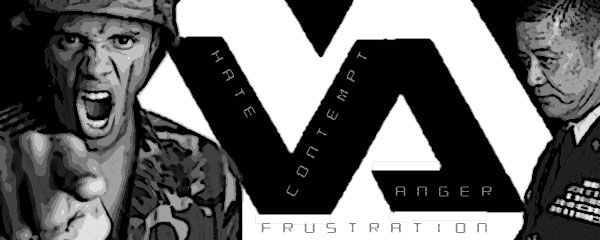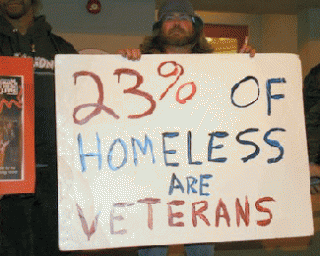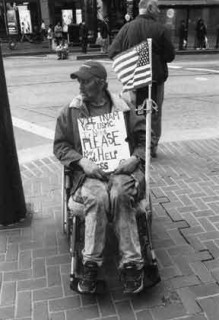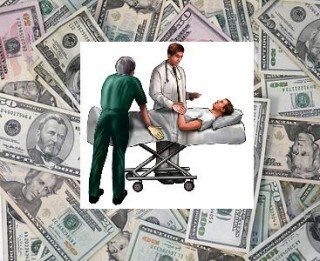
“Suspicion about motives eventually leads to the cynicism and disrespectful attitudes toward patients that are very common among physicians who have trained in VA medical centers.”
These words were quoted by Reporter Douglas Mossman for CBS Money Watch way back in 1994. Given the recent trashing to Veterans Claiming PTSD by Allen Breed of the Associated Press, the question remains just how much of this hostile attitude toward America’s Veterans continues to be promoted within the VA, and mainstream media, today in 2010?
The two recent articles we posted about Associated Press reporters spreading rumors about malingering Veterans based on testimonials from one former VA employee leads us to conclude that this exaggerated attitude may still exist within the VA by a few employees from administrative management to professional medical staff to medical students down to custodial staff. One aspect that may aggravate and sustain this negative attitude toward Veterans is the fact that the vast majority of VA employees, including Mental Health staff, are not VETERANS.
This is not intended, like the AP reports slam Veterans, to paint a broad stroke that all VA employees have a hostile attitude toward Vets, I know first-hand as a former VA employee and current user of VA health care that this is not so by far. The vast majority of VA employees are committed to the mission of caring for America’s Veterans without patronizing us.
Robert L. Hanafin, Major, U.S. Air Force-Retired, VT News Network
At the VA, it pays to be sick

SHOULD WE encourage veterans with psychiatric problems to remain ill?
Should we encourage them to undergo unnecessary hospitalization?
And, for those already hospitalized, should we encourage longer hospital stays than necessary?
Surely most people–experts and nonexperts alike–would say no.
Yet the Department of Veterans Affairs (VA) provides exactly these sorts of incentives to our nation’s veterans. Sadly, a program with good intentions has yielded a series of perverse incentives that reward illness, encourage patients to view themselves as incapacitated, and poison the relationships between patients and their caregivers.
Veterans who use the VA are either Poor or Suffer from a Service-Connected injury
 VA medical care and benefits are provided at virtually no cost to veterans who meet eligibility requirements. To qualify, a veteran must either be “poor” (annual income below about $19,000 for a couple) or must suffer from a “service-connected” (SC) injury or disability. SC injuries and disabilities are medical problems incurred or aggravated during or shortly after a period of military service.
VA medical care and benefits are provided at virtually no cost to veterans who meet eligibility requirements. To qualify, a veteran must either be “poor” (annual income below about $19,000 for a couple) or must suffer from a “service-connected” (SC) injury or disability. SC injuries and disabilities are medical problems incurred or aggravated during or shortly after a period of military service.
The Birth of Post Traumatic Stress Disorder – an Ultra-Conservative View
 For decades, the VA has recognized disorders associated with severe disturbances in thought (e.g., schizophrenia) and mood (e.g., manic-depressive illness) as potential sources of SC disability. Research over the past two decades has helped define another type of trauma-related mental disturbance–one that results from the experience of a catastrophic event that need not involve physical injury. While some of the earlier psychiatric literature contains references to “shell shock” and “war neurosis,” these conditions were officially recognized in the American Psychiatric Association’s 1980 diagnostic manual as “post-traumatic stress disorder” (PTSD).
For decades, the VA has recognized disorders associated with severe disturbances in thought (e.g., schizophrenia) and mood (e.g., manic-depressive illness) as potential sources of SC disability. Research over the past two decades has helped define another type of trauma-related mental disturbance–one that results from the experience of a catastrophic event that need not involve physical injury. While some of the earlier psychiatric literature contains references to “shell shock” and “war neurosis,” these conditions were officially recognized in the American Psychiatric Association’s 1980 diagnostic manual as “post-traumatic stress disorder” (PTSD).
Someone with PTSD does not evince gross disturbances of thought or mood. Instead, a PTSD sufferer persistently re-experiences (while awake or asleep) a horrible event he has witnessed, avoids stimuli reminiscent of the event, is emotionally unresponsive, and experiences persistent physiological arousal. PTSD can result from non-war experiences (it is often encountered in rape victims, for example), but seems particularly prevalent among Vietnam veterans.
As noted above, a service-connected disorder makes veterans eligible for free medical care at VA hospitals. It also can entitle them to disability compensation. In 1991, the VA paid out nearly $10 billion in compensation to more than 2 million veterans with SC disabilities, approximately 300,000 of whom had significant psychiatric disabilities.
As of mid-1993, compensation ranged from $85 to as much as $1,730 a month
 The amount of compensation depends on a veteran’s social and work impairment, as determined by one of the VA’s Regional Office Rating Boards. Psychiatric disability is rated at six levels, from 0 percent (which confers eligibility for treatment but no monetary compensation) to 100 percent. As of mid-1993, compensation ranged from $85 to as much as $1,730 a month. Time missed from work and loss in work efficiency is two of the most important factors considered in determining disability levels.
The amount of compensation depends on a veteran’s social and work impairment, as determined by one of the VA’s Regional Office Rating Boards. Psychiatric disability is rated at six levels, from 0 percent (which confers eligibility for treatment but no monetary compensation) to 100 percent. As of mid-1993, compensation ranged from $85 to as much as $1,730 a month. Time missed from work and loss in work efficiency is two of the most important factors considered in determining disability levels.
Veterans with spouses and children receive additional funds, and compensation is adjusted each year for inflation. These payments do not reduce a veteran’s other disability or retirement benefits, although they do reduce Social Security Supplemental Income. Disability compensation is exempt from federal and local taxes; thus, a single veteran receiving 100 percent SC benefits receives the same after-tax income as a Cincinnati, Ohio resident who earns $30,040 a year.
The VA Claims Processing System can be Simple or Complex to Maneuver Through
The process of obtaining SC compensation can be simple or complex. Veterans file their initial claims at VA regional offices, and local Rating Boards make decisions based on the evidence supplied (e.g., military service records, work records, medical treatment records, and results of medical disability examinations). If a veteran disagrees with a decision, he can appeal to the local board, and if he disagrees with its decision, he can appeal to the Board of Veterans Appeals (BVA).
If this fails, he can ask the BVA to reconsider, or have the decision reviewed by the Court of Veterans Appeals (CVA), or simply initiate a new claim with the Regional Office Rating Board. Each year, veterans file more than 600,000 disability benefit claims. The VA grants about half of these; of those that are rejected, about one-fifth are appealed. There is no limit on how many times a veteran may submit a claim. Furthermore, each time a veteran submits new evidence in support of his claim, he is entitled to all procedural rights accorded initial claimants. New evidence might include documentation of inability to work or records of recent hospitalization.
Such documentation is only one way in which a veteran’s level of functioning and course of psychiatric treatment may alter his compensation long after the time he sustained a service-related disability. If, for instance, a veteran is partially (less than 100 percent) disabled, but is hospitalized for more than twenty days for an SC-related problem, he will be deemed totally disabled for that period and receive one month’s compensation at the 100 percent SC rate. There is little financial incentive for patients to leave a VA hospital. The care is free, and is provided by government-salaried physicians who are not pressured (by insurance company reviewers, for example) to discharge patients expeditiously.
 The result of the VA’s cost-free hospital treatment and its disability compensation is that veterans are provided with financial incentives to use inpatient psychiatric services frequently and for lengthy periods. Veterans are, in effect, encouraged to be (or appear) ill and unable to work or function socially. Unsurprisingly, one commonly finds that the overwhelming majority of Vietnam combat veterans undergoing psychiatric inpatient treatment at VA hospitals have applied for disability compensation. Veterans who are new to the system and unaware of the financial incentives quickly learn from fellow patients and from benefits counselors.
The result of the VA’s cost-free hospital treatment and its disability compensation is that veterans are provided with financial incentives to use inpatient psychiatric services frequently and for lengthy periods. Veterans are, in effect, encouraged to be (or appear) ill and unable to work or function socially. Unsurprisingly, one commonly finds that the overwhelming majority of Vietnam combat veterans undergoing psychiatric inpatient treatment at VA hospitals have applied for disability compensation. Veterans who are new to the system and unaware of the financial incentives quickly learn from fellow patients and from benefits counselors.
Who are these Veterans?
 As noted above, current eligibility rules restrict the use of VA facilities to veterans who have SC disabilities or are poor. About 90 percent of current VA patients are men, a large portion of them Vietnam-era veterans who enlisted or were drafted at a time when people with financial means, college prospects, or other social advantages tended to avoid military service.
As noted above, current eligibility rules restrict the use of VA facilities to veterans who have SC disabilities or are poor. About 90 percent of current VA patients are men, a large portion of them Vietnam-era veterans who enlisted or were drafted at a time when people with financial means, college prospects, or other social advantages tended to avoid military service.
Consequently, the VA inpatient psychiatric population does not constitute a typical cross-section of the population, nor even a typical group of randomly selected veterans. A disproportionate number of veterans who receive psychiatric treatment at VA hospitals were abused or had behavioral problems as children, dropped out of high school, joined the service at a young age, have limited intellectual and work skills, have serious substance-abuse problems, or have a history of poor work habits.
Aspects of this Biased Report that Most Likely are being applied TODAY in 2010
These veterans represent that segment of the population most affected by a changing economy, in which high-paying manufacturing jobs (and other high-paying jobs traditionally performed by men with limited job skills and no college degrees) are becoming increasingly scarce. Many hospitalized VA patients can hope to compete only poorly in today’s job market, and so have very limited financial prospects. The typical psychiatric inpatient, even if he had a strong desire to work, would have very little hope of obtaining employment that would give him an income as high as 100 percent SC status. 
As Professor Susan Estroff has pointed out, seeking disability compensation may not represent an outcome of illness so much as a rational choice of income strategy. For many patients, being in the hospital compares favorably to being elsewhere. Many patients are homeless, or have very little contact with caring family or other sources of social support, or have trouble getting along with those with whom they live, or live in lonely, destitute, uncomfortable circumstances.
In the hospital, by contrast, their past service to country is recognized (so that being hospitalized gives them a sense of being valued), their needs for food, clothing, and shelter are met without cost or effort, medical and nursing staff address them respectfully and express interest in them, their own ability to occupy their time is supplemented by structured recreational and therapeutic activity, and they have the companionship of other patients.
For some, the VA satisfies unconscious needs to be nurtured and to be dependent, while for others the VA provides a target for feelings of deprivation and rage that would otherwise be overwhelming. For many veterans, their time at war was the most meaningful period of their lives. Coming to the hospital, being among fellow veterans, and exchanging stories give them a chance to re-experience the bonhomie and sense of purpose they felt as young warriors.
Tempting Unfortunate Veterans with Money
 Our government surely does worse things than tempting unfortunate veterans with money, and occasionally succoring them in hospitals. Why, then, is the problem so serious?
Our government surely does worse things than tempting unfortunate veterans with money, and occasionally succoring them in hospitals. Why, then, is the problem so serious?
The answer is that these perverse incentives to be sick and not care for oneself represent the antithesis of good psychiatric treatment. Psychiatrists recognize, of course, that people are flawed and vulnerable and may reach points in their lives where they are unable to manage without the intensive emotional, physical, and financial support that hospitalization provides. But the most general aim of psychiatric care–the aim that unites the variety of treatments psychiatry now offers–is to foster personal autonomy and responsibility.
The VA Disability Benefit System is an Incentive Not to Work
 A disability-benefit system that makes it financially attractive to be too ill to work is contrary to psychiatry’s therapeutic goals. So is a treatment system that sometimes simply satisfies physical and emotional needs without encouraging patients to learn how to satisfy those needs independently.
A disability-benefit system that makes it financially attractive to be too ill to work is contrary to psychiatry’s therapeutic goals. So is a treatment system that sometimes simply satisfies physical and emotional needs without encouraging patients to learn how to satisfy those needs independently.
Researchers have devoted some attention to the ways in which financial incentives might tempt VA patients to behave or report their symptoms, and to the possible effects on psychiatric outcomes.
Vietnam Combat Veterans Over-Report their symptoms
 Psychologist Lee Hyer and colleagues have published a number of studies describing the tendency of Vietnam combat veterans to “over-report” their symptoms. The researchers speculate that an important reason for this over-reporting is the secondary gain involved. The VA system “rewards” persons for existing psychopathology. As one Vietnam veteran put it: “The object is convince people you are hopeless. When this occurs they both believe you and then help you with compensation.”
Psychologist Lee Hyer and colleagues have published a number of studies describing the tendency of Vietnam combat veterans to “over-report” their symptoms. The researchers speculate that an important reason for this over-reporting is the secondary gain involved. The VA system “rewards” persons for existing psychopathology. As one Vietnam veteran put it: “The object is convince people you are hopeless. When this occurs they both believe you and then help you with compensation.”
A 1992 study in Hospital and Community Psychiatry found that: patients who benefited financially from extended admissions had a significantly greater proportion of hospital stays exceeding 20 days. The system of monetary rewards for veterans with service-connected partial disabilities appears to prolong inpatient stays.
“The Problem Patient in VA Psychiatric Services”
 Clinicians generally avoid criticizing patients publicly, but the psychiatrists who organized a 1990 discussion of “The Problem Patient in VA Psychiatric Services” stated quite frankly that patients receive: varying degrees of veterans’ pensions which may support pathological life-styles…. |I~t is a fair observation that certain problematic aspects in the VA system are experienced to a much higher degree than elsewhere, including extraordinary rates of alcohol and drug abuse and character disorder in patients who are adversarial, highly demanding, and have a strong sense of entitlement. Professional reports also document patients’ attempts to feign symptoms of mental disorders, especially PTSD.
Clinicians generally avoid criticizing patients publicly, but the psychiatrists who organized a 1990 discussion of “The Problem Patient in VA Psychiatric Services” stated quite frankly that patients receive: varying degrees of veterans’ pensions which may support pathological life-styles…. |I~t is a fair observation that certain problematic aspects in the VA system are experienced to a much higher degree than elsewhere, including extraordinary rates of alcohol and drug abuse and character disorder in patients who are adversarial, highly demanding, and have a strong sense of entitlement. Professional reports also document patients’ attempts to feign symptoms of mental disorders, especially PTSD.
Seven out of 175 Veterans Fake symptoms of PTSD
Shortly after the VA recognized PTSD as a compensable disorder, Drs. Edward J. Lynn and Mark Belza speculated that simulated PTSD was “a not uncommon disorder that arose as a consequence of the Vietnam conflict.” The researchers found that 7 of 125 patients admitted to their VA hospital between November 1982 and March 1983 presented feigned symptoms of PTSD; none of these patients had participated in combat, and some had not even been to Vietnam. (This figure does not include other veterans who had experienced combat, but may have exaggerated the severity of their symptoms.) Lynn and Belza noted that clinicians at other VA facilities have corroborated their findings.
Drs. Loren D. Pankrantz and Landy Sparr have published accounts of veterans who fabricated war experience; such behavior is discovered only when clinicians examine military records and realize that the veterans could not have been where they said they were.
Unlike Schizophrenia or Manic-Depression PTSD is easier to Fake
PTSD is unlike schizophrenia or manic-depression, illnesses in which patients suffer gross disturbances in thought or mood that are readily observable and relatively difficult to simulate convincingly for long periods. Clinicians determine the nature, severity, and impact of most PTSD symptoms chiefly by interviewing patients and using psychological test data garnered from patients’ reports.
PTSD may be induced by non-combat traumata, and it can be difficult for clinicians to determine whether a veteran’s difficulties stem from war experiences or from other experiences such as childhood abuse. As with many mental disorders, most PTSD symptoms are not pathognomonic: persons who abuse alcohol or drugs, are depressed, or have constellations of behavior and character traits that psychiatrists’ term “personality disorders” share many of the same symptoms as PTSD sufferers.
Dr. Stephen Salloway and his colleagues, for example, have described how a [homeless] veteran who “had been hospitalized in a number of VA hospitals over the years and had extensive exposure to Vietnam veterans being treated for PTSD,” but who himself had an antisocial personality disorder and alcohol and heroin abuse problems, used his knowledge of PTSD to deceive professional staff and obtain controlled substances and shelter. Mental health researchers have difficulty determining the extent of feigned illness among veterans reporting PTSD symptoms.
VT Editorial Comment: Repeat a lie enough it becomes truth. Note that throughout this article the terminology “difficulty determining the extent of feigned illness among veterans reporting PTSD symptoms is used excessively.
Potential Financial Compensation Does Induce Veterans to Exaggerate PTSD
A report in the Journal of Traumatic Stress, for example, considered whether potential financial compensation induced non-SC Vietnam combat veterans to exaggerate PTSD symptoms on a standardized psychological test. The authors concluded that it did not. However, they reached this conclusion by comparing the non-SC veterans’ test scores to those of two other groups of veterans, most of whom were not fully service-connected and who therefore would also have had reasons to exaggerate symptoms. Moreover, all three groups had test scores that strongly suggested the veterans were exaggerating. Hyer and colleagues believe that financial incentives play an important role in veterans’ behavior, and suggest that VA clinicians may eventually accept complaining, exaggeration, and over reporting of symptoms as features of PTSD itself. “It is unclear whether this ‘really’ represents greater psychopathology or a response style independent of psychopathology….”
The existence of such incentives does not mean that patients’ acts are governed only by those incentives. My experience suggests that the vast majority of VA psychiatric inpatients come to the hospital suffering from serious emotional problems. But the financial incentives insidiously alter patients’ perceptions of those problems, their relationships with health care professionals, and their view of themselves. Conversations with colleagues across the nation confirm my personal observations. Here are some illustrations:
* Physicians and nurses are aware of the benefits to patients of hospitalization, and often cannot help but wonder whether reports of symptoms reflect actual problems or problems that are factitious or malingered. No good clinician wants to discharge a suicidal patient, or withhold needed treatment, but ambiguity about a patient’s motives can increase these kinds of errors. Suspicion about motives eventually leads to the cynicism and disrespectful attitudes toward patients that are very common among physicians who have trained in VA medical centers.
Some VA Staff have a Negative Attitude toward Vets making more money than them
Other staff who work with patients are affected by the veterans’ [monetary] incentives as well. As Estroff has documented, VA workers are often compensated less than patients. And these workers, unlike their patients, must endure the frustrations of employment to make a living.
* Inappropriate incentives also lead clinicians to urge patients to solve problems in ways that undermine their autonomy and responsibility. One of my colleagues urged a 50 percent SC veteran who was severely depressed and facing bankruptcy to seek 100 percent service connection as a partial solution to the financial problems that were tormenting him. Another patient who very much wanted to work was urged to seek increased compensation rather than cope with the challenges of a job that his physician deemed “highly stressful”–a paper route.
Veterans are good at Hustling the system
Patients are very aware of the connection between remaining sick and remaining eligible for compensation. They frequently exercise their right to obtain copies of their hospital records and to petition the VA to have the contents emended. Patients regularly exchange information about increasing compensation and about their success at hustling the system. Patients occasionally refuse diagnostic studies or complain about their results because they are afraid a diagnostic change will eliminate their compensation. They ascribe all of their problems to their SC diagnoses and want physicians to do so, too. (One veteran who was hospitalized largely because he was planning to kill a relative became furious with me when his discharge papers listed a diagnosis of “interpersonal problems” rather than his SC psychiatric disorder. Although he had displayed no symptoms of the disorder while hospitalized, he thought the alternate diagnosis might threaten his 100 percent SC compensation, to which, he told me, his six years’ service to his country had entitled him.)
* As noted above, twenty-one days of hospitalization entitles a patient to receive a month of 100 percent SC compensation. This leads to a lengthening of the inpatient stays of patients with partial disability ratings. Dr. Raymond Pary and his colleagues speculate that the financial incentives operate discreetly, with patients bringing up new complaints to lengthen hospitalization, or physicians allowing patients to stay out of sympathy or a desire to avoid “confrontation with an irate veteran.” My experience suggests that the process isn’t always subtle. Patients often protest being discharged expeditiously, and explicitly cite the twenty-one day provision and their need for money as reasons for not leaving sooner.
They are sometimes enraged that their doctors are ignoring an important facet of their overall well-being. Shrewder patients complain of severe symptoms for three weeks, but report rapid resolution of their symptoms on or about their twenty-second day of hospitalization. Some patients in financial trouble report suicidal intent in order to have them admitted, and continue to report this for three weeks even though they appear okay; the suicidal intent fades after three weeks. At the time of discharge, some patients insist that their doctors cite their SC diagnosis as the main reason for hospitalization so that they can be sure to collect 100 percent SC compensation for the month.
Oftentimes, years of unemployment leave persons sincerely believing they cannot work. Disability compensation systems encourage patients to view all their difficulties as “health problems,” and provide alternatives to conventional employment that encourage patients to view their non-work as a result of their medical status. “Their not working is seen as both symptom and proof of their disabilities and deficits,” explains Estroff.
Many unemployed SC veterans see no good reason to try to resume working.
It would be very hard for most of them to find jobs as remunerative and untroubling as receiving 100 percent SC compensation, and they believe that taking a job might result in their losing disability income after their next review. Estroff describes one veteran who was reluctant to pursue a writing career because: if I make it, then they might take away my VA money. And I can’t be sure about working but I can be sure about the VA. All I have to do is keep being me and not working. So I guess I’m better off just leaving well enough alone.
Estroff also quotes a letter written to the VA by a community treatment organization–it reported that encouraging veterans to work was:
Difficult, not because of the disabilities and disorders they possess, but because of the large veterans’ disability pensions that they have and are receiving…. Over and over again we have heard these men talk of their unwillingness to participate in employment efforts because they do receive the money.
* Attaining 100 percent SC status represents an important symbolic achievement for some veterans, who declare their status proudly. Although they may not get the kind of recognition and satisfaction that work provides, their past sacrifices are vindicated by the highest level of disability compensation that the VA offers. Disability reviews and the threat of disability reduction cause some patients great anxiety, and they sometimes seek hospitalization in response (perhaps with the unconscious intent of convincing the review board and themselves that they are still disabled). Studies of civil litigants alleging emotional or physical injury have found that litigation itself can be very stressful, and that level of functioning is positively correlated with the time elapsed since the end of litigation and negatively correlated with the duration of litigation. The VA’s system thus represents the worst possible approach to handling disability claims, since a veteran can reapply endlessly and his claim can be reviewed for up to twenty years after disability is established.
“V-A-cations.”
* Patients regularly seek hospitalization for inappropriate reasons: to escape the deprivation and loneliness they experience in their daily lives; to get away from the criticisms, expectations, or demands of their wives and children; to hide from criminal associates; and to have food and shelter when they aren’t getting along with family or have run out of money. (Patients know enough not to state these reasons at the time of admission; they claim that they plan to kill themselves or someone else if not admitted. These tactics are often successful, because mental health professionals have no special ability to distinguish those patients who really would harm themselves from those who feel terrible but would not.) Many patients experience “elevator cures”: their countenances brighten and their symptoms disappear as they are transported up to the hospital wards. Many patients have limited interest in participating in treatment activities. A patient of mine once acknowledged that being in a hotel would satisfy his needs just as well as being in the hospital, but “this is free and I’m entitled to it.” Colleagues tell me that such patients frequent many VA centers and their hospitalizations are termed “V-A-cations.”
Like other public-sector psychiatric facilities,
VA hospitals struggle with patients who have genuine mental conditions that require hospitalization, who get well while hospitalized, but then stop taking their medication and begin deteriorating shortly after discharge. Some patients are admitted again and again while intoxicated (sometimes with drugs or alcohol purchased with their disability funds), and repeatedly induce or exacerbate psychiatric symptoms through drug use. Mental health professionals term this process the “revolving door” syndrome. VA patients and their families may have little incentive to break this cycle, for it often has emotional and financial rewards: troublesome, ill relatives are hospitalized, so their families do not have to deal with them–but families do retain the veteran’s SC income. The very real problems just described are, to my mind, of less consequence than the moral dilemmas that are created. Persons faced with incentives to be sick come to believe sincerely that they are sick. It is profoundly contrary to veterans’ interests to construct a health care system in which doctors expect patients to get well but patients have good reasons to feel ill. In medical treatment generally, and especially in psychiatric treatment, an honest, trusting relationship between doctor and patient is crucial. It is disrespectful to patients and physicians to place them in a treatment relationship in which there is substantial potential for mutual distrust and frustration. Some simple solutions
It would be far wiser to recognize forthrightly the financial and social forces affecting patients, to recognize that the moral dilemmas created by these forces are not amenable to clinical interventions alone, and to recognize that health care systems with such perverse incentives can make treatment impossible. Recognizing that these problems exist is the first step in solving them. Making some or all of the following changes would reduce incentives for patients to act or remain ill, and would at the same time improve the treatment atmosphere for psychiatric patients at VA medical centers.
* The financial reward for remaining hospitalized over twenty days should be eliminated. The fact that a veteran may need periodic hospitalization and so lose income should be factored into the veteran’s fixed disability payment.
* Findings of psychological injury and disability level should be permanent, once a veteran has accepted a disability payment. In civil litigation, persons who successfully sue for psychological injuries receive a lump sum once legal action has concluded. Civil litigants have their day in court, receive a judgment and, once they accept that judgment as final, go on with their lives. Veterans deserve the same sort of finality in their disability determination process. If veterans, rating boards, and reviewing agencies all knew that disability judgments, once accepted, would be final, all parties would have an increased interest in ensuring that disabilities were well-documented and that the disability determination process was accurate and fair. It may be unwise to award some veterans lump sums, lest they use their money foolishly (e.g., throw it away or buy drugs) and leave themselves destitute; they might better have their funds administered by a trustee, or paid monthly, as is currently the case. But all psychiatrically disabled veterans should understand that getting better will not reduce their income.
http://findarticles.com/p/articles/mi_m0377/is_n114/ai_15139612/pg_7/#comments
VT Editorial Comment: As noted above, criminals faking Veterans’ status using fake discharge papers is the real deal, in fact fakes who have served but elaborate their service or exaggerate their PTSD or other ailments is a real problem. However, when we are talking 48 convictions for fraud out of the millions of Veterans who use the VA system, one can see why we’ve used a few graphics in this presentation as SATIRE moking those Social Scientist who exaggerate just how bad the prolbem is or how much money is wasted by the VA. (Let’s say in comparison to the billions wasted by the Pentagon, and let’s not forget the priviledge these same critics of Veterans get from being able to experiment on us without even having to serve in combat beside us).
The point is that claims of America’s Veterans living off the VA to make money are just as exaggerated as the VERY FEW fake Vets they wish to expose. The sorry fact may be that those having this hostile view of America’s Veterans, even within the Veteran community, could far outnumber those Vets who are malingerers.
We at VT believe that critics of a VA system that is being overly generous to our nation’s Veterans continue to hold this negative and hostile anti-Veteran attitude today. Unfortunately a few still work for the Department of Veterans Affairs, pray fully precious few, but fortunately most of the folks giving this biased anti-Veteran testimony have retired from the VA or moved onto other vocations better fitting this attitude hopefully not working with or experimenting on Veterans.
We are not over reacting here, every study mentioned in this hit piece, every report, every examination would not be possible without the ability to experiment on America’s Veterans of War. By definition a Social Psychologist or Psychiatrist that does studies on Veterans (voluntarily or involuntarily done or unbeknown to the Veteran is an experiment in social science). Frankly, if experimenting on us could deliver something positive besides belittling and stereotyping us, I for one would not have a problem with being a Guinea Pig.
This lame attempt at lumping Veterans receiving various ratings for PTSD with overall compensation received by Veterans for SC disabilities is a SHAM, although about 300,000 are mentioned as having ‘significant psychiatric disabilities’ the percentage of the $10 billion dollars quoted going to that 300,000 is conveniently omitted. Although of course the amounts would vary today and most likely be higher due to adjustment for inflation and COLA, what the reporter conveniently or intentionally leaves out is the fact that Veterans are MEANS TESTED and were being means tested in 1994 to be placed on categories based on ability to pay. Meaning there were whole classes of Veterans using the VA in between POOR and Service-Connected. Throw in the closing of military bases and military base hospitals before September 11, and you have an entirely new class of Vets forced to use the VA – Military Retirees. This biased anti-Veteran report gives the illusion that Disabled Veterans just like Military Retirees get FREE HEALTH CARE FOR LIFE, and neither group does, they pay co-pays for their medical care.
The very wording used by these few doctors is the same wording used by Mr. Allan Breed in his 2010 Associated Press Hit Piece on Veterans faking PTSD potentially being a growing problem among both young and older Veterans of War. It would be interesting to note that MOST of these hostile critics of Veterans has ever been to war.
Where and Who they are Today-Those Who View America’s Veterans as Unfortuate
 Dr. Susan Estroff is no longer with the Department of Veterans Affairs but is now (2010) a Professor, Social Medicine and Adjunct Professor, Anthropology and Psychiatry at The University of North Carolina at Chapel Hill School of Medicine. Her primarily interested has been in the socio-cultural forces that influence the biographical experiences of persons with disabling chronic illnesses. Some of the socio-cultural factors that have occupied her attention in research are: representations of illness and identity; individual economies of disability; the impact of disability income on identity and illness trajectory; and how use of mental health or psychiatric services influences self labeling and illness accounts among persons with major psychiatric disorders.
Dr. Susan Estroff is no longer with the Department of Veterans Affairs but is now (2010) a Professor, Social Medicine and Adjunct Professor, Anthropology and Psychiatry at The University of North Carolina at Chapel Hill School of Medicine. Her primarily interested has been in the socio-cultural forces that influence the biographical experiences of persons with disabling chronic illnesses. Some of the socio-cultural factors that have occupied her attention in research are: representations of illness and identity; individual economies of disability; the impact of disability income on identity and illness trajectory; and how use of mental health or psychiatric services influences self labeling and illness accounts among persons with major psychiatric disorders.
She is also interested in exploring how interpersonal and contextual factors influence the occurrence of violence by persons with serious mental illnesses, as well as how such violence is conceived of and operationalized by researchers with varied agendas and training. The study of persons with serious mental illness has occupied most of her research career. Her current work branches out to the study of cultural influences on consent for experimental maternal fetal surgery, and an analysis of community based stigma reduction strategies.
Lee Hyer, EdD, ABPP is today a Professor of Psychiatry at the University of Medicine and Dentistry of New Jersey—Robert Wood Johnson Medical School. He is the director of a geriatric clinic at the University Behavioral Health Care of UMDNJ and directs geropsychology training at UMDNJ. He is the director of a geriatric team that includes geropsychiatry fellows, geropsychology fellows, psychology interns, and graduate students at Rutgers’ Graduate School of Applied and Professional Psychology and the Department of Psychology. Clinical work involves nursing homes, assisted living facilities, and outpatient clinics, as well as primary care clinics.
Current research includes neuropsychology profiles and memory retraining in dementia, cognitive behavioral therapy in LTC facilities, heart rate variability, and depression and anxiety disorder patterns in older adults. He is the author of over 180 articles and book chapters, and has written two other books. He is a Fellow in American Psychological Association (APA) and Gerontological Society of America (GSA) and has received awards from these organizations, as well as the Department of Veterans Affairs (VA) and UMDNJ.
Readers are more than welcome to use the articles I’ve posted on Veterans Today, I’ve had to take a break from VT as Veterans Issues and Peace Activism Editor and staff writer due to personal medical reasons in our military family that take away too much time needed to properly express future stories or respond to readers in a timely manner.
My association with VT since its founding in 2004 has been a very rewarding experience for me.
Retired from both the Air Force and Civil Service. Went in the regular Army at 17 during Vietnam (1968), stayed in the Army Reserve to complete my eight year commitment in 1976. Served in Air Defense Artillery, and a Mechanized Infantry Division (4MID) at Fort Carson, Co. Used the GI Bill to go to college, worked full time at the VA, and non-scholarship Air Force 2-Year ROTC program for prior service military. Commissioned in the Air Force in 1977. Served as a Military Intelligence Officer from 1977 to 1994. Upon retirement I entered retail drugstore management training with Safeway Drugs Stores in California. Retail Sales Management was not my cup of tea, so I applied my former U.S. Civil Service status with the VA to get my foot in the door at the Justice Department, and later Department of the Navy retiring with disability from the Civil Service in 2000.
I’ve been with Veterans Today since the site originated. I’m now on the Editorial Board. I was also on the Editorial Board of Our Troops News Ladder another progressive leaning Veterans and Military Family news clearing house.
I remain married for over 45 years. I am both a Vietnam Era and Gulf War Veteran. I served on Okinawa and Fort Carson, Colorado during Vietnam and in the Office of the Air Force Inspector General at Norton AFB, CA during Desert Storm. I retired from the Air Force in 1994 having worked on the Air Staff and Defense Intelligence Agency at the Pentagon.
ATTENTION READERS
We See The World From All Sides and Want YOU To Be Fully InformedIn fact, intentional disinformation is a disgraceful scourge in media today. So to assuage any possible errant incorrect information posted herein, we strongly encourage you to seek corroboration from other non-VT sources before forming an educated opinion.
About VT - Policies & Disclosures - Comment Policy



